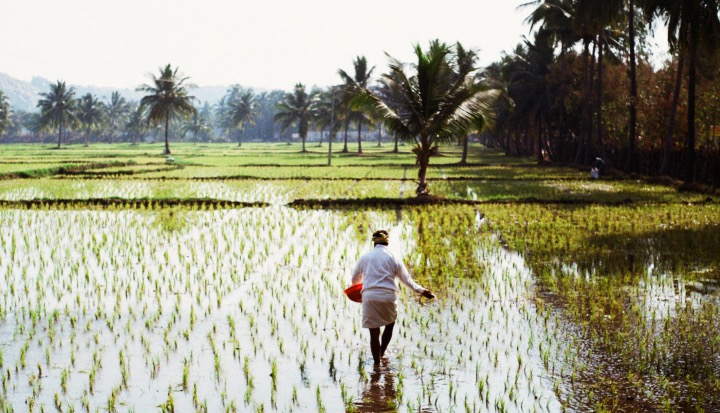More than 500 million smallholders, especially in rural areas of developing countries, form the backbone of global food systems. Here, agriculture is often the main source of employment and economic activity. As these regions also bear the heaviest burden of climate impacts, investing in climate resilience is not only urgent, but also essential to sustain livelihoods, reduce poverty and tackle environmental injustice. Research shows that the agri-food sector is one of the lowest-cost opportunities to reduce global emissions, particularly in middle-income countries and the rice and livestock sectors. Countries should prioritize “climate-smart” agriculture, using nationally determined contributions and global partnerships, when formulating their climate strategies. But how can they manage this transformation, especially in the face of resource scarcity? This should be a critical thinking point to be discussed at COP 29.
Market systems development (MSD) offers a promising model for designing and delivering climate resilience and climate justice. This approach aims to create sustainable and scalable change by strengthening linkages between all actors within the market system – farmers, input suppliers, processors, financial institutions and policy makers. By improving the whole system, rather than providing isolated support, market systems approaches can create long-term impact and increase climate resilience. The MSD approach is particularly important in today’s rapidly changing world, where more cost-effective and adaptive approaches are required to account for changing political priorities, rapid shocks and stresses. At the same time, business participation in sustainability and public private sector partnerships is increasing. Business fights poverty and We mean Businessand this provides new opportunities for participation in the market systems approach.
The AV Group is a leader in designing and implementing a market systems approach to prioritize both green sectors and greener development practices, resulting in agricultural sector growth and climate resilience. The AV Group consists of ACDI/VOCA and its affiliates Tanager, Fundación ACDI/VOCA and AV Ventures.
It is an example of the development of market systems Honduraswhere ACDI / VOCA implements projects with USAID and the Honduran government. One area of focus here is bio-inputs, which include organic fertilizers, soil amendments and natural pest control products: we know these technologies support productivity, soil health and can even reduce greenhouse gas emissions, but they are expensive for many. farmers. To address this challenge, the project looks at the system of market participants already working in these supply chains and developing existing entrepreneurs and service providers by facilitating connections, technical assistance and access to finance. The project supports soil testing laboratories to increase their service offerings and reach more farmers. By taking this systems approach, the impact is greater than just supporting organic fertilizer production: last year, the project, with an annual program budget of only about $1.5 million, supported more than 50 companies and they generated $10 million in revenue. new sales, they invested $4 million of their own money and reached about 95,000 hectares of cultivated land. In addition, the use of bio-inputs and other sustainability practices cuts the GHG footprint of products such as coffee in half.
Member of AV Group in India Tanager Peppermint oil with Mars is running a sustainable sourcing project. This project applies a market systems approach and leverages private sector investment for sustainability and business development. In this peppermint oil supply chain, farmer-owned production companies sell inputs such as planting material to affiliated farmers; After production, these companies buy and blend peppermint oil to then sell it to Mars Wrigley’s supply chain. Identifying a weakness in the planting material, Tanager contacts the Central Institute of Medicinal and Aromatic Plants of India to obtain improved plant stock, which is then sold to a network of “propagator” farmers for widespread distribution. These “breeders” then sell the mint plants to farmer-producer companies, who in turn deliver them to their members. Tanager also maintains a research and development division that advises farmers on soil and crop inputs to minimize irrigation and reduce production costs. After 7 years of implementation, the work has supported nearly 26,000 smallholders to increase peppermint oil yields by 20% and double peppermint income compared to the baseline, thanks in part to the lower cost of production from water irrigation. In the coming years, the project intends to track water use and carbon footprint to understand its contribution to climate mitigation and sustainability.
Apart from agriculture, MSD approaches are applied in sectors such as textiles, tourism and information technology, all of which intersect with climate resilience goals. However, more robust evidence and partnerships with the research community are needed to prove the effectiveness of these approaches. Unlike traditional, discrete interventions such as cash transfers, market systems approaches are large-scale, adaptive, and variable. Building a strong data and evidence base will be critical to scaling these solutions and securing support from global stakeholders.
Innovative market systems approaches are changing the landscape of economic development, agriculture and climate justice and are being enhanced by platforms like these. USAID Market Systems Partnership activity and MSD center. Current experiences show that empowering small entrepreneurs, building strong market linkages and prioritizing sustainability can have a long-term impact. To achieve climate justice, the global community must support these systems-based solutions that ensure equitable, sustainable growth in agriculture.

